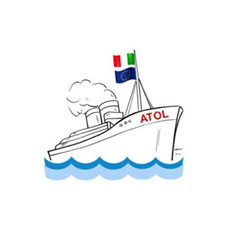The ATOL project proposes the study of advanced Thermal Energy Storage (TES) systems on board large and modern ships. In particular, different innovative TES technologies will be analysed to be mainly used on cruise ships (new or to be revamped).
Specifically, numerical and empirical studies are proposed with the aim to i) experiment with new TES technologies (as sorption devices) in different design and operating conditions; ii) develop and validate a novel dynamic simulation tool for the energy, economic and environmental analyses and multi-objective optimization of these energy saving technologies applied to ships.
Nowadays, the interest in the potential adoption of TES devices on cruise ships is primarily due to the need for environmental sustainability. In fact, through TES systems it will be possible to obtain lower energy consumption and therefore reduce pollutant emissions into the environment.
Note that, in the coming years even the newest and technologically advanced most modern cruise ships, even though fed with less impacting fuels for the environment, will still be equipped with internal combustion engines which are characterized by high heat waste. In the described scenario, through the adoption of innovative TES devices (e.g. sorption technology, PCMs, etc.) it will be possible to recover a large share of the waste heat coming from the exhausted gases and from the medium and low-temperature cooling system of the ship engines (not directly exploited by the onboard users). Specifically, the waste heat will be collected and stored during the ship motion hours and will be used in the ship’s stationary time, i.e. when the vessel is at anchor or the port. During these hours (or days) the onboard thermal energy needs will be primarily balanced by TES systems, allowing the aforementioned ship engines to be switched off. Therefore, by adopting innovative TES technologies on board ships it will be possible i) to avoid or reduce the production of heat through combustion systems, by obtaining fuel savings and thus avoiding polluting emissions; ii) balance the peak loads of ship thermal energy demand by significantly smoothing the related time profile, obtaining a potential size reduction of boilers or other backup devices for producing heat. Obviously, in both the above-mentioned i) and ii) cases economic savings will be also achieved. Even in the case of cold-ironing, the adoption of suitable TES devices will bring energy, economic and environmental impact benefits, since it will be possible to avoid or reduce the conversion of shore electricity into heat to be used on board. In any case, significant energy savings and avoided pollutant emissions are expected. By the numerical and experimental studies carried out in the ATOL project, useful design criteria will be obtained.
ERC Sector: Products and Processes Engineering
